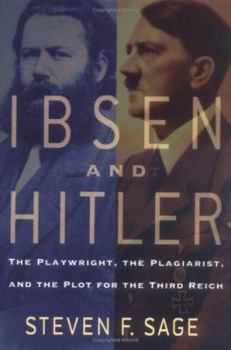Ibsen and Hitler: The Playwright, the Plagiarist, and the Plot for the Third Reich
Select Format
Select Condition 
Book Overview
Customer Reviews
Rated 5 starsLife imitates art: The script for the Third Reich
Once in a while, a book comes along that makes you completely rethink everything you thought about a certain subject. 'Ibsen and Hitler' is such a book. Adolf Hitler is arguably the most written about individual of the 20th century. Historians have painstakingly scrutinized his deeds and words for over half a century, and in the process have given us some outstanding biographies. But the one question that still eludes us to...
0Report
Rated 5 starsIbsen and Hitler: Exciting New Discovery
It is refreshing to read history that is totally new. Much has been written about Hitler, but this is unique. Steven Sage has made a very credible case for his thesis that Hitler, a person obsessed with theatre, figured out how to reach his humber one priority, the extermination of the Jews, by reading and internalizing aspects of three of Ibsen's plays. Although taking place in the context of a psychological mind-set to...
0Report
Rated 5 starsMimetic Syndrome
This is an amazing story that connects the dots between some of Hitler's major decisions and even some personal one's and the characters and script of three of Ibsen's plays. It is a complicated subject made into a relatively easy read. You don't have to be an Ibsen or a Hitler expert to enjoy this book. It is a good read for those interested in the interface of psychology, politics and history. It is not written like...
0Report
Rated 5 starsA+ THRILLER
IBSEN AND HITLER: THE PLAYWRIGHT, THE PLAGIARIST, AND THE PLOT FOR THE THIRD REICH by Steven F. Sage "Burning with curiosity, Alice found herself falling down a very deep well, filled with cupboards and bookshelves, maps and pictures. Wondering how she was ever to get out again, she discovered a tiny golden key. She tried the little golden key in the lock, and to her great delight it fitted!" Steven Sage has discovered a...
0Report
Rated 5 starsReview: Ibsen and Hitler
Ibsen and Hitler: The Playwright, the Plagiarist, and the Plot for the Third Reich by Steven F. Sage / Carroll & Graf, New York, 2006 / $27.95 IBSEN AND HITLER was thoroughly engrossing. It grabbed hold of me like a snapping turtle and wouldn't let go for a week - I carried it with me to work and read it in traffic, at lunch - I read late into the night so that I was worthless until noon one day - I got the willies during...
0Report













